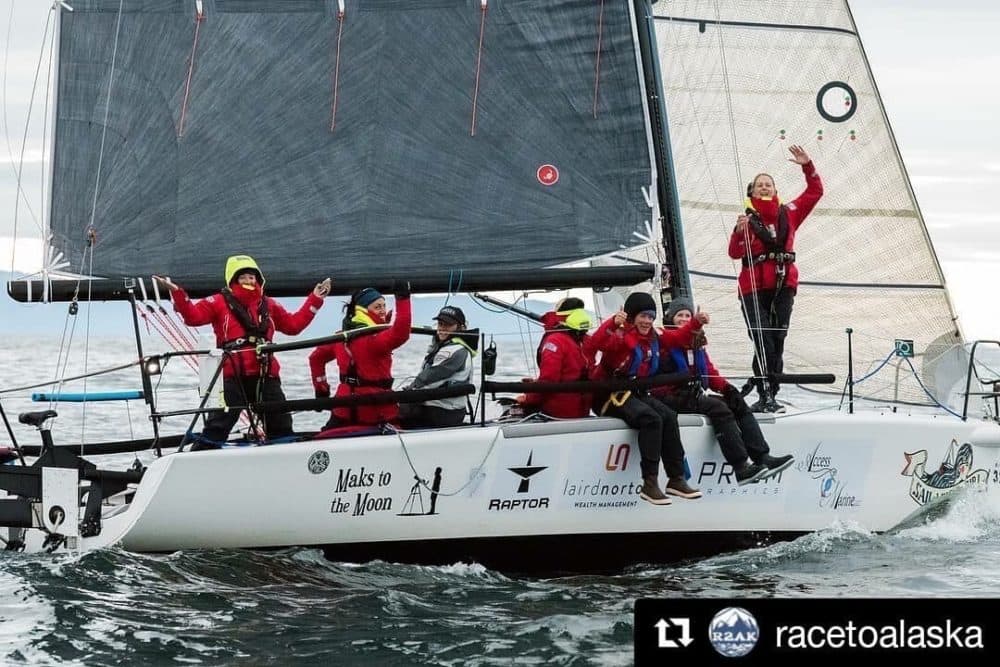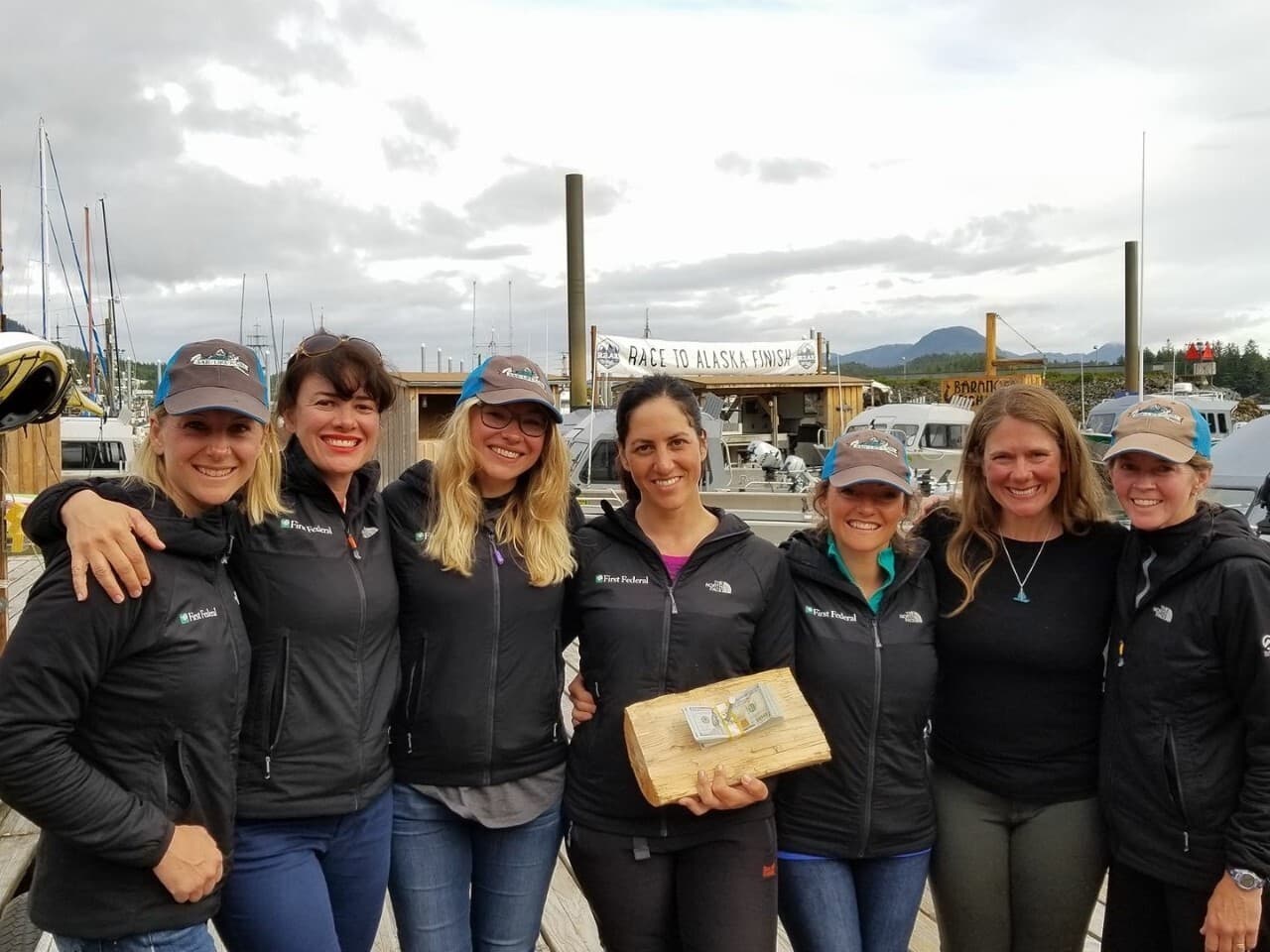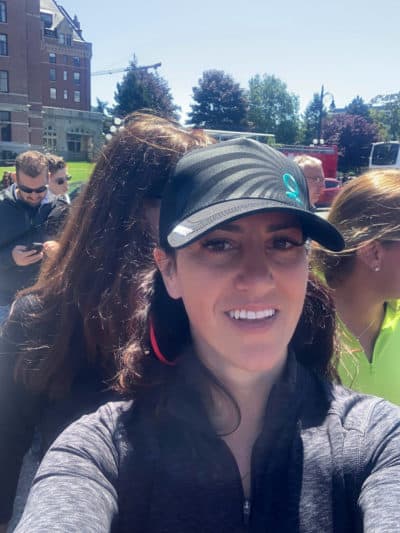Advertisement
The All-Women Sailing Crew That Beat The Men In The 2018 'Race To Alaska'

"Two o'clock in the morning on the way north to Alaska is incredibly dark," Captain Jeanne Goussev says. "It's black ink sky. You cannot even see the bow of the boat."
Jeanne and her team of seven women sailors are competing in the Race to Alaska. Their team is called "Sail Like a Girl." And they have been at it 24/7 since they left Victoria Harbor four days ago. The whole team is exhausted and on edge in the dark. A GPS unit has failed. There are rocks out there, but where? Jeanne woke up to help figure that out and calm her crew.
"Out of the blue, we were in what felt like a massive car crash."
Jeanne Goussev
"Out of the blue, we were in what felt like a massive car crash," Jeanne says. "You're on a boat in the middle of nowhere. And that is your island. It is your safety. It's your entire world. And, in that moment of hitting something as hard as we hit it, I knew that that boat might not be able to carry us anymore."
Jeanne and her crew were still 190 miles from their destination: Ketchikan, Alaska.
The Race to Alaska is not for the faint of heart. All boats are welcome. The only rule: the boat must be human or wind powered. That’s it. Everything else — course, vessel, crew — is up for grabs.
The first place prize is $10,000. For second, it's a set of steak knives. Third gets you nothing.
Building The Team
Jeanne is an experienced sailor and captain. She wanted the challenge. She also wanted to test the idea that the most competent sailors are men. The plan came together, as many good things do ...
"It happened over whiskey," she says. "It was at the end of a race. And at the yacht club party, as is pretty typical, the guys are all puffing up their chests and talking about their warrior moments on sailboats, and it's hard to even be part of those conversations. And I was particularly frustrated that weekend at, just, the masculinity in our sport. So, Anna asked me, 'Would you ever do the Race to Alaska with an all-women's crew?' And I immediately said, 'Yes.' "

Anna is Sail Like a Girl teammate Anna Stevens.
"Within a week, I was looking at boats online and trying to concoct a plan for what to do and how to build a Race to Alaska team," Jeanne says.
She found a used 32-foot boat in Dana Point, California. They christened her "Maks to the Moon."
"I knew that was the boat that we needed," Jeanne says. "It is a Ferrari on the water. It's super fast and it has a big open transom. So I knew we could put bikes on it."
The bikes are for when there is no wind. Remember: the race is 750 miles, wind and human power alone.
"We call it our 'boat cycle' — our bikes off the back of our boat with propellors attached," Jeanne says.
The newly formed Sail Like a Girl team spent weekends taking the boat apart — upgrading and repairing all the equipment on board. Their boat is a daysailer, meant for short, single-day races. No head. No galley. They had to come up with a plan for the cooking, sleeping and the potty.
Advertisement
The ladies bonded during these long boat building sessions. When they were ready to hit the water, they sailed together twice a week for training. After about three months, they were ready. The boat was packed to the brim with gear, food, water, number 1 and 2 buckets and a ton of sails. It was time for the race.
'Pure Magic'

But that first step wasn’t the easiest.
"The fear of the unknown is unrivaled by most things," Jeanne says. "The first — and the most difficult — step is the one where your foot leaves the dock. The anticipation of that one moment is huge, because you don't know what happens next."
But the start was quiet. The women were on course and biking their way to Ketchikan. Cell service was spotty. They were surrounded by the beauty of the coast and unconcerned with the outside world. All that mattered was the boat, the ocean, their teammates and the race.
Then they got to the Bella Bella, a waypoint in the 2018 competition. There, they got an update. They were in the lead. Also, they got cell service.
"We got in touch with our community for, really, the first time, and we realized that we were being supported by women everywhere, and that we had people rooting us on and that really wanted us to do well," Jeanne says. "We no longer were doing this just for us. We were doing this for other people. And the stress landed on our heads like a ton of bricks. For the first and only time onboard the boat, our team dynamic broke."
Sailing away from Bella Bella, tempers were short. The women retreated to the corners of the boat. Conversations were snippy. Everyone was complaining about their job on the boat, and unsure what to do. To sail the boat properly the women had to come back together. They had to work as a team.
"We had Kelly on board," Jeanne says. "Kelly's a yoga instructor. And she said, 'OK, everybody close your eyes, except for Haley, who's driving.' And she led us through breathing exercises. And so the entire dynamic of the boat is now back to this positive, happy place."
With the team dynamic reestablished, Jeanne headed to bed.
"So, I go down below, and I get into my sleeping bag. And my head hits the pillow, and I heard the best word that possibly could have happened in that moment. It was Kelly yelling, 'Orcas!' There's nothing like being surrounded by a pod of orcas to change the mood of any situation. It's just magic," Jeanne says. "It's pure magic."
Led by the orcas, and back in synch with each other and the wind, Team Sail Like a Girl was still in the lead. There were a lot of challenges ahead, and the women were ready to face them.
Dead Stop
Then, sailing through that inky, dark Alaska night at 2 a.m., that pesky GPS unit failed. Jeanne woke up and came out on deck.
"We are in hundreds of feet of water," Jeanne says. "And, out of the blue, we are in a two o’clock in the morning all-lights-out car crash. We were going probably eight knots, seven to eight knots of boat speed. And we came to a dead stop."
Seven to eight knots is roughly 10 miles per hour.
"All I could think, because I'm holding my GPS, and I screamed it, I was like, 'There are no rocks here. How did we run aground? How did we run aground? There are no rocks here. There's over 100 feet of water.'
"And Haley said, 'Jeanne, Jeanne, look off the back!' And I came to the transom of the boat and looked down, and there was a log hanging off the back of the boat," Jeanne says. "And it was lodged on our keel."
Jeanne guessed the log was 20 feet long, and they were sitting on it in the middle of the open water.
"So we got everybody down on the low side and heeled the boat over. And the log popped up and floated away," Jeanne says. "But we didn’t know if we were damaged. We knew that there was not really help anywhere close, and it's part of the race. You have to be able to help yourself. You have to be able to save yourself out there."
They sat, sails down until the sun came up. The boat was immobilized for hours. Any chance at winning seemed gone.
"You have to be able to help yourself. You have to be able to save yourself out there."
Jeanne Goussev
In the morning, the team raced on, monitoring their injured boat. They were still pushing as hard as they could to get to the finish line. Which, after another two days of sailing, was in sight. About 20 miles from the finish, they got cell service and discovered they were in the lead.
The team planned to be on dock ringing the finish line bell by dinner time. Then the wind died, and night set in. The harbor was a confusing mashup of fishing boats, buoy lights and barges. They were having trouble finding the finishing dock. Finally, they spotted a light swinging in the darkness and knew that must be it.
With a time of 6 days 13 hours and 17 minutes, Team Sail Like a Girl won the 2018 Race to Alaska.
Team Sail Like a Girl competed in the Race to Alaska again in 2019. The 2020 event was canceled due to the pandemic.
This segment aired on August 1, 2020.